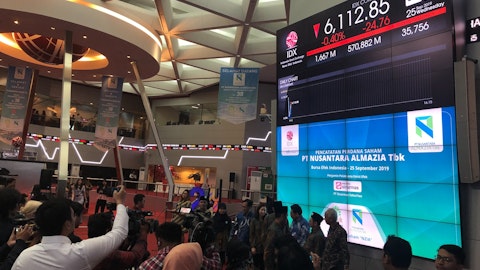And as I said people will be less focused on cash and accounts and more focused on investment opportunities, that’s when you’re going to see the double kicker.
Ebrahim Poonawala: Got it. I guess a good time for you to hand off. Your successor will be thanking you for that. But a quick question…
James Gorman: I hope so.
Ebrahim Poonawala: I think, Sharon, you mentioned about focus on secular growth, I think international expansion, E-Trade is done now. I’m assuming you’re not doing any big M&A anytime soon. Just talk to us about international expansion, a lot of disruption on wealth management, private banking globally, what the opportunities are, where we are investing. We’d love some color around that?
Sharon Yeshaya: Investing more broadly internationally, James mentioned the deals or what we’ve been working on, I should say, MUFG 2.0 between research and also our sales and trading side. We continue to look for opportunities. We have Arun Kohli, who’s been working on our India franchise. I think that there are clearly opportunities there. Within India, we see a lot of opportunities throughout Asia. We’ve discussed different opportunities also all across the international franchise in Europe. So when you look at, think about investment management. That was one of the key points that we had talked about potential distribution of investment management Eaton Vance products all over Europe. We’ve seen that. We continue to see products with Calvert, with various active ETFs that we’re seeing all across Europe again.
And we’ve been raising new AUM there. So there are ways to distribute product across different geographies. There’s a way to work with our strategic partners in places like Japan. There are ways to organically take advantage and move forward in places of growth that have more secular growth trends such as India. So there are tremendous opportunities where we see that we can take, like I said, product-client relationship and also work across institutional securities and various places in investment management. Dan Simkowitz has talked a lot about that of raising funds through those partnerships and being able to look for ways to work together to also source talent internationally as we work across the organization.
James Gorman: And I just said, I mean, I was in the Middle East a few months ago, we’re opening an office in Abu Dhabi. If you think of the combination Middle East, India, Japan, kind of, offsetting what’s going on in China. And then strategically, I would be very surprised if this firm doesn’t do some transactions in both wealth and asset management over the next three years outside the U.S. I think we have a game plan for it. Strategically, the team has worked on a lot of ideas. And obviously, we want to make sure when we do it, we’re, you know, we’re fully ready and we understand all of the, you know, the diligence issues around some of these relationships and careful about that, but I think the opportunities are clearly there.
Operator: We’ll go next to Dan Fannon with Jefferies.
Dan Fannon: Thanks, good morning. I wanted to follow-up on flows. Obviously feed-based flows strong in the quarter, but the total flow number came in and understanding the environment was a bit softer here in the third quarter? Could you maybe talk about the channels where the pullback was seen the most? You didn’t mention workplace, so I’m not sure you would love some color there as well?
Sharon Yeshaya: Yes, we’ve talked — thanks Dan for the question. We have talked about the fact that within the workplace channel, I think both in the first and second quarter, I’ve been asked about it. And it is people are using some of that cash. We aren’t necessarily seeing that movement directly into people’s accounts and they’re seeing actual, you know, taking the stock that they might get and actually selling it rather than investing on it, given what’s going on with the economic environment, potentially inflation, et cetera. So that’s, you know, potentially a theme out there. But obviously, that’s dependent on the market. What is more exciting in my mind is actually where we did see the increase in NNA, which was on new clients and recruiting.
So those were the two strongest components. And the ability to attract new clients, I’ve said it before on these calls, if you asked me five years ago, well before we bought E-Trade and when we were just looking at the beginning of the modern wealth platform, many people ask how will you ever grow, because we weren’t seeing new clients coming into the institution. The investments that we’ve made across the technology for wealth management has been what’s been able to attract new recruits. So if you talk to recruits about why they come to Morgan Stanley, it’s the projects they can offer, it’s the technology that we have, it’s the ability to work with the clients. So you’re seeing that continue and then you’re also seeing new client acquisition through the funnel.
So those are all positive metrics. And again, you see that in the stock plan participants rising as well.
Dan Fannon: Great, thank you. And then just a follow-up on investment banking and understanding the environment isn’t ideal, but you did talk about increase in announcements. So I was hoping you could provide some context maybe on the sponsor community and maybe how those conversations are happening? And just overall backlog levels versus kind of last quarter.
Sharon Yeshaya: Yes, the backlog itself, we’ve continued to rise and to build. Overall, over the course of the year, we’ve talked a lot about sort of being at some of the highest levels that we’ve seen across all of the underwriting or on the advisory side. So all of that is optimistic. Financial sponsors, we have talked about dry powder, continue to see that. Obviously, there was some valuation gaps and as James said, the more clarity that we see around the stabilization of rates, the easier that will be around deployment. And then some key themes that we have witnessed when we look at the backlog or we think about the transactions that are happening. One is the financial sector consolidation, that’s a theme that’s emerging within our pipeline and our discussions in the boardroom.
The second is the energy transitions. That, again, that is important to some of the transactions that we have worked on and that we’ve talked through. And in addition to that, we are seeing emerging themes around technology, around AI, around how companies want to use that when they’re thinking about strategic focus and objectives. And all of these themes are part and parcel to the fact that you can see there’s — it’s a diversified backlog. And we’re investing in the franchise. We’ve made some key hires to help us navigate through this more complex landscape and places where we see opportunities to execute as we move forward.
Operator: We’ll go next to Steven Chubak with Wolfe Research.
Steven Chubak: Hi, good morning, James. Good morning, Sharon.
James Gorman: Good morning.
Sharon Yeshaya: Good morning.




